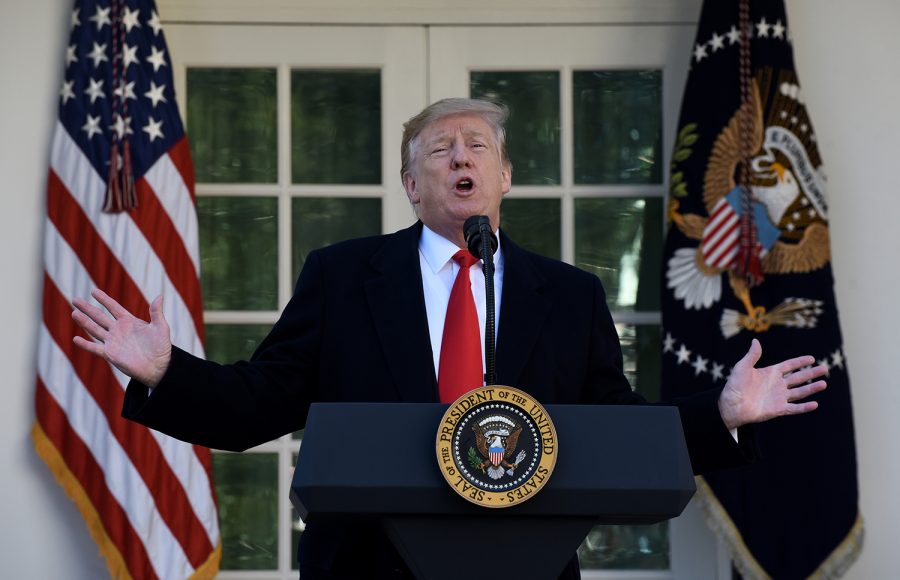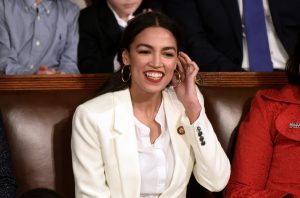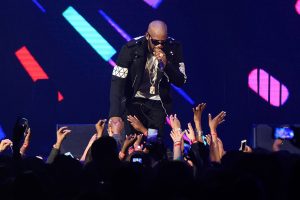Neal: Politics and The Post: what should their connection be?
It’s not fair to say that President Donald Trump is the only politician who opposes certain media rhetoric, but the problematic way he interacts with the media opposition needs to be acknowledged.
(Olivier Douliery/Abaca Press/TNS)
February 5, 2019
For as long as I can remember I’ve been taught that questions are good.
Being inquisitive is how one learns — and sometimes, being inquisitive means challenging those I don’t always agree with. But of course, there’s a line in the sand — case in point: the media and politicians.
It’s no secret that President Donald Trump is notorious for blasting the media — specifically taunting CNN with a label of “fake news.”
But self-proclaimed democratic socialist Rep. Alexandria Ocasio-Cortez, D-N.Y., has also challenged the media.
Ocasio-Cortez has called out CBS News for allegedly not hiring any black journalists to cover the 2020 election.
RELATED: Banerjee: The new millennial face of fireside chats
She then questioned the Washington Post’s comments comparing her to Trump’s “Pinocchios,” as she referred to them, regarding comments made on military accounting offsets via Twitter. She also fell under scrutiny for excluding media from two of her campaign town halls during her run in 2018.
Or why did @washingtonpost give my confusing tweet on military accounting offsets the same “Pinocchios” as Trump’s flat denial of how many Americans died in Puerto Rico?
These are legitimate questions not intended to attack. Who makes these decisions? How? Is there a rubric?
— Alexandria Ocasio-Cortez (@AOC) January 7, 2019
But despite these arguably odd actions from a left-leaning progressive who is relatively new to the public eye, Ocasio-Cortez still manages to engage with these outlets.
In addition to challenging CBS News and the Post, Ocasio-Cortez also scolded PolitiFact, questioning its decision-making methods and whether there was a rubric in making said decisions. PolitiFact responded, linking the principles of its “truth-o-meter,” as well as the logic behind its fact-checking methods.
Ocasio-Cortez also prefaced her criticisms of the Post and PolitiFact with the notion that she was posing legitimate questions that were not intended as an attack.
Now contrast Ocasio-Cortez’s criticisms with those of Trump.
We do spell out our process for selecting what facts we check. You can see it here https://t.co/M6EVP3A7Qh
tl;dr version: We focus on significant statements likely to be repeated by others that we think people will question whether or not the information is true.
— PolitiFact (@PolitiFact) January 7, 2019
RELATED: AOC doesn’t need your social media advice
The president of the United States referred to the media as the “opposition party.”
No joke.
In fact, Trump has repeatedly praised Fox News while claiming CNN to be at the “bottom of the totem poll” and that MSNBC can’t even be compared with any of the other shows.
Where’s the healthy discourse? Where’s the openness to opinion and genuine interest in understanding the opposition in order to better understand it?
Nonexistent, in Trump’s case.
RELATED: AOC should be careful about her online presence
As someone who studies both journalism and political science, I recognize the importance of criticism. Inquisition is what drives journalism — why wouldn’t I expect that same inquisition from my readers?
But unlike Ocasio-Cortez, Trump is not generating a dialogue with members of the media. He is trying to shut them down and paint them as an enemy of the people if said media fails to praise him.
What’s ironic is democratic socialist Ocasio-Cortez’s socialist label often got lumped by some as a communist (which, let’s get this straight, is not true.) But in reality, the communist and Marxist government rule and communist theory of mass communication refers to the government controlling the media so it can maintain its power in full.
Now, I’m not necessarily arguing that Trump is a communist, but I am arguing that by comparing the two strategies of handling media opposition, only one is reminiscent of this early 20th-century theory that is clearly the antithesis of our First Amendment constitutional rights.
So a year from now, when we Iowa-dwellers are but days away from caucusing, ask yourself this: Are questions good, or is blindly taunting “fake news” making its way into our nation’s norm?







